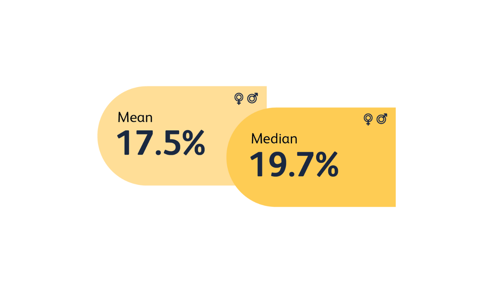The Royal College of Physicians (RCP) monitors and publishes its gender pay gap on an annual basis.
On 5 April 2024 the RCP employed a total of 460 staff, comprising 318 (69%) women and 142 (31%) men. This includes people working for the Federation of the Royal Colleges of Physicians of the UK as they are employed by the RCP. Following the national rules, on the pay period our data cover, 14 women were excluded from the pay gap and pay quartile sections of the report because they received less than their normal pay (due to maternity and sick leave).
The number of full-pay relevant employees used to calculate our gender pay gap was therefore 446 staff (304 women and 142 men).
This is a significant increase on 2023 (373 employees) as a result of the number of casual workers that fell under relevant employees during this period (82). Casual workers include examiners and clinicians employed on a short-term basis for projects. The RCP employed workforce excluding casual workers was made up of a total of 378 staff, comprising 261 (69%) women and 117 (31%).

In 2024, the median gender pay gap for the RCP was 19.7%. The mean gender pay gap was 21.9%. This represents an increase of 1.9% for the median, and an increase of 4.2% for the mean on the 2023 figures. This includes the 82 casual workers included in our calculations.

Excluding the casual workers, the mean gender pay gap was 17.5% and the median was 19.7%.

Further analysis

This figure shows the proportion of women and men in each pay quartile. The quartile pay bands are calculated by dividing the workforce into four equal bands ranging from the highest to the lowest hourly rate. The deviation from the distribution of staff that we would expect to see in each quartile, based on the gender split of the RCP’s workforce, is shown in red. These data show that women made up 74.8% of employees in our lower quartile (a decrease of 5.9% on 2023), and 83.9% of employees in the lower-middle quartile (an increase of 6.3% on 2023).
There was an almost equal split between women and men in senior roles making up our upper quartile. Our executive leadership team comprising the most senior staff roles at the RCP, is made up of five men and four women.
Actions and next steps
The inclusion of 82 casual workers employed on 5 April has contributed to the increase in our gender pay gap for 2024. However, even without considering them, we are disappointed that there has been no progress in reducing the gap. While we do not have an inherent equal pay issue – our compensation practices for equivalent roles remain fair – we are committed to ensuring that our overall gender balance is closely monitored. We will not lose sight of our goal to continuously review and act upon our pay gap, setting long‐term, evidence-based actions to drive improvement over time.
We will continue to build on the actions we committed to undertaking in previous years and align them to the government report on effective evidence-based actions for employers. Building on our previous commitments and new initiatives this year, we have taken several key actions, including:
- Enhanced recruitment and promotion oversight:
We continue to ensure that our recruitment practices involve diverse interview panels with transparent criteria. In addition, we have implemented a new system designed to attract a diverse pool of talent and to monitor the demographics of all applicants more effectively. Our rigorous tracking of internal promotions ensures that no pay disparity exists between colleagues in similar roles. - Strategic pay transparency and benchmarking:
In line with evidence based practices observed in leading organisations, we will conduct regular benchmarking exercises to evaluate our pay data. This ensures that even if our overall gap reflects our college’s makeup, individual roles remain equitably compensated. - Strengthening family and flexible work policies:
We are reinforcing support for family leave and flexible working arrangements – initiatives that not only help balance work and life responsibilities but also contribute to a more gender equitable workplace. - Empowering women in leadership:
Our recently launched Gender Pay Gap Action Group (GPGAG), led by two executive directors, is dedicated to exploring innovative, long term strategies for reducing the gap. In May 2024 we established the RCP Women’s Network. As well as supporting the work of the GPGAG, the Women’s Network is working towards delivering priorities determined by the women of the RCP, including supporting women at different stages of their career and challenging others’ assumptions and behaviour. We hope the impact of the work of these two groups will address the systemic causes of inequality that result in a gender pay gap. - Ongoing data driven commitment:
We continuously analyse how the RCP’s workforce structure impacts gender balance, focusing on key areas of our people strategy that enhance our practice as a college. These improvements, in turn, help target the gender pay gap by ensuring our processes remain fair and inclusive.
Together, these actions represent our ongoing commitment to fostering a fair, inclusive and progressive environment where every employee’s contribution is valued – and where our gender pay gap is systematically reduced over time.
I confirm that our data have been calculated according to the requirements of the Equality Act 2010 (Gender Pay Gap Information) Regulations 2017.

Chiraag Panchal
Executive director, People and Culture





